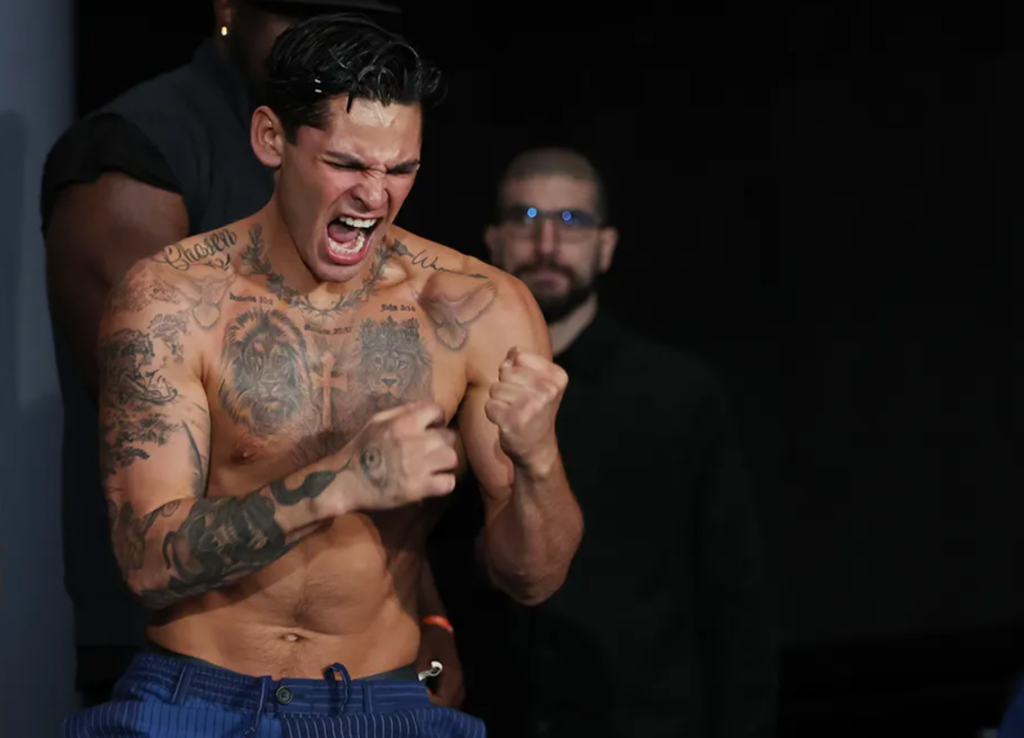Two Supplements Provided by Ryan Garcia Test Positive for Ostarine

By Eddie Sanchez
Two supplements listed on doping control forms submitted by star boxer Ryan Garcia before his victory over Devin Haney were found to contain the banned substance ostarine, according to a report from the Sports Medicine Research and Testing Laboratory (SMRTL) released on Thursday.
The doping control forms, reviewed by ESPN, were submitted alongside Garcia’s urine samples collected on April 19 and 20, the day before and the day of the fight. Both samples tested positive for ostarine.
The supplements in question were NutraBio SuperCarb, a raspberry-lemonade flavored product that showed ostarine levels of 70-2200 picograms per gram of powder, and Body Health’s strawberry-flavored amino-acid blend, which showed levels of 660 to 830 picograms. Other supplements listed by Garcia included vitamin D3, iron, Thorne elite multivitamins, and magnesium glycinate.
Paul Greene, who has represented UFC stars Jon Jones and Sean O’Malley in doping cases, expressed hope to ESPN that the presence of ostarine in the supplements would result in a reduced suspension for Garcia from the New York State Athletic Commission.
The commission’s doping rules operate under strict liability, meaning the fighter is responsible for any substances they consume. Greene acknowledged Garcia’s “negligent component” but argued it stemmed from an “innocent mindset.”
“The World Anti-Doping [Agency] code recognizes the declaration of a supplement in advance as proof that the athlete took it, allowing for a reduced sanction in most cases,” said Greene, a founding partner of Global Sports Advocates, who is representing Garcia with three other attorneys.
“I’m hopeful the punishment will be at the lowest end of the scale,” he added. “Sanctions are based on the degree of fault, and when dealing with a contaminated supplement where the banned substance isn’t listed on the label or detectable via internet search, the athlete couldn’t have known without sending it to a WADA-accredited lab in advance.”
Greene hopes to avoid a commission hearing and reach an agreement on Garcia’s punishment with all parties involved, including the WBC and NYSAC.
“We understand Ryan will face some sanction,” Greene said, “but we believe it should be light given the evidence. Four months or less would be appropriate.”
However, not everyone agrees. Victor Conte, a sports nutritionist and performance adviser for Haney, told ESPN the test results “cannot be authenticated due to the lack of chain of custody.” The lab reports indicated the supplements were unsealed when submitted.
“Why test powders from unsealed containers?” asked Conte, founder of Bay Area Laboratory Co-Operative (BALCO). He served time in prison for distributing performance-enhancing drugs before founding SNAC, a sports nutrition company.
“In my opinion, tampering seems likely. Testing product samples from unsealed containers of the same batch numbers is necessary for credible results. Unsealed container test results cannot be authenticated, which isn’t how credible science is conducted.”
Ostarine is a selective androgen receptor modulator (SARM) that binds to proteins in the body, signaling muscle growth. It is used to enhance performance by building muscle mass, increasing fat loss, and improving stamina and recovery. Ostarine has been on the World Anti-Doping Agency’s banned list since 2008 and was classified as an anabolic agent by WADA in 2022.
Garcia knocked Haney down three times in his majority decision win but was ineligible to win the WBC junior welterweight title as he was 3.2 pounds overweight. Amid this controversy, Garcia has challenged fighters like Sebastian Fundora and Errol Spence Jr.